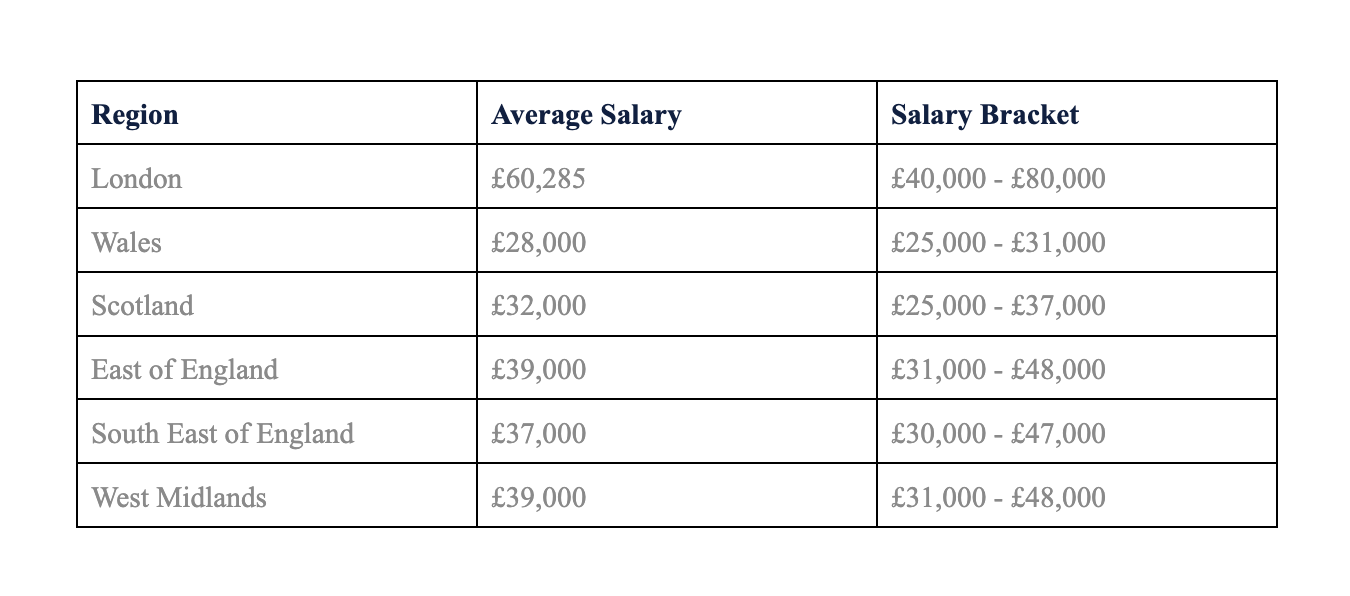Senior: From £48,000 - £80,000
Mid-level: From £38,000 - £50,000
Junior: From £27,000 - £40,000

View our current EA jobs board to benchmark against the current roles we have advertised.
What is the highest salary for an executive assistant?
The ceiling for executive assistant salaries can stretch impressively high, particularly in demanding markets and prestigious companies.
In the UK, the highest salaries are typically found in London, where an experienced executive assistant can earn on average £60,285 annually, and the salary ceiling for a senior EA can reach £80,000.
Peak salaries often belong to EAs serving C-level executives in top-tier sectors like investment banking, private equity, and law.
Take a look at our EA Job Description template.
Factors Influencing EA Salaries
Region
The geographical location of an executive assistant's role greatly affects their salary potential. London stands out as the top-paying city in the UK due to its status as a financial and business hub, with salaries reaching upwards of £60,000 for seasoned professionals.
In other major cities like Manchester and Leeds, executive assistants can expect to earn between £27,000 and £38,000. This salary still reflects the significant roles they play in local businesses but is tempered by the lower cost of living compared to London.
Moving towards Scotland, Northern Ireland, and Wales, the salary scales dip slightly more, aligning with the regional economic dynamics and living costs.
Industry
The industry within which an executive assistant works influences their compensation. High-stakes environments such as Investment Funds, Private Equity, Banks, Insurance, and Law firms, especially those headquartered in London, are known for their lucrative pay scales.
These sectors prize the executive assistant's ability to manage sensitive information, uphold confidentiality, and provide seamless support to high-calibre executives, and compensate them well for their specialised skills and reliability.
Experience
Experience is a critical factor in determining the salary of an executive assistant.
- Junior assistants with 0-3 years of experience generally earn between £25,000 and £40,000 annually.
- EAs with 3-5 years of experience can see their salaries increase to the range of £38,000 to £50,000.
- Senior EAs with over 5 years of experience, especially those who have developed niche skills or specialised in high-demand industries, salaries can soar as high as £80,000. But are more likely to be in the range of £50,000 - £60,000.
These increasing salaries with experience reflect EAs' expertise and the greater levels of responsibilities they are entrusted with.
Specific Job Roles
The specific duties and titles held by executive assistants also play a crucial role in salary determination. Due to the critical nature of their roles, EAs serving C-level executives, such as CEOs, CFOs, or Directors, are at the top of the pay scale.
These professionals are required to perform administrative tasks as well as being trusted confidants who handle confidential information, manage personal schedules, and may even take on roles that overlap with personal management. Their integral position within the corporate hierarchy justifies their higher salaries compared to those in less senior roles.
See here for help with crafting the ideal EA Job description.
Common Benefits and Non-Financial Perks for EA Roles
While the base salary is a significant component of an executive assistant's compensation, benefits packages and non-financial perks also play a crucial role in the overall attractiveness of these positions.
Employers are increasingly recognising the importance of comprehensive benefits to attract and retain top talent, especially in competitive markets.
Enhanced Flexibility
One of the most prominent trends of the 2020s is the increased flexibility in working arrangements. Many companies now offer remote or hybrid working models, allowing executive assistants to balance their professional and personal lives more effectively.
This flexibility broadens the pool from which employers can recruit, no longer limiting them to candidates who live within commuting distance of the office.
Health & Wellness Benefits
Health insurance, including medical, dental, and vision coverage, may be part of the benefits package for full-time executive assistants.
Beyond insurance, many employers are extending wellness programmes that include:
- Mental health support
- Gym memberships
- Stipends for fitness and wellness activities
These initiatives acknowledge the stressful nature of high-level administrative roles.
Financial Incentives
In addition to competitive salaries, executive assistants may be offered performance-related bonuses and profit-sharing plans, particularly in sectors like finance and law where the profitability of the firm significantly impacts compensation.
These financial incentives are designed to align the interests of EAs with the goals of the company and reward them for their contributions to organisational success.
Professional Development
Investment in an executive assistant's professional development might include funding for professional certifications, attendance at relevant industry conferences, or even formal education in related fields. Such opportunities not only benefit the assistants personally and professionally but also help them contribute more effectively to their roles.
Additional Perks
Other common perks include:
- Enhanced parental leave
- Childcare assistance
- Flexible spending accounts
- Transportation subsidies
- Housing assistance or relocation packages
- Exclusive travel opportunities
The combination of these benefits with a robust salary package makes the role of an executive assistant particularly appealing and underscores the importance of non-financial benefits in the compensation mix.
Interested in Hiring An EA? We'd Love To Help You
Oriel Partners excels in matching top-tier executive assistants with your business needs. Discover how we can help you hire the perfect EA to enhance your executive team's efficiency.


